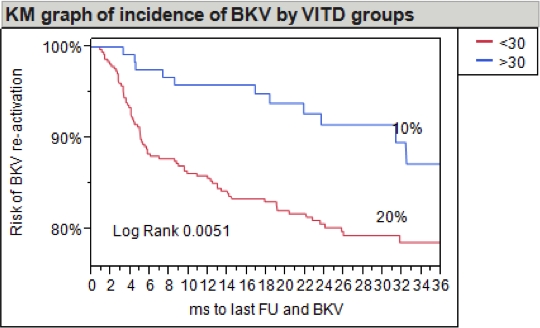25-Hydroxyvitamin D Insufficiency Is Associated with Higher Risk of BK Virus Re-Activation After Kidney Transplantation.
1Internal Medicine, Case Western Reserve University, Cleveland, OH
2Cleveland Clinic, Cleveland, OH.
Meeting: 2016 American Transplant Congress
Abstract number: 433
Keywords: Kidney transplantation, Polyma virus
Session Information
Session Name: Concurrent Session: Kidney: Polyomavirus
Session Type: Concurrent Session
Date: Tuesday, June 14, 2016
Session Time: 2:30pm-4:00pm
 Presentation Time: 2:30pm-2:42pm
Presentation Time: 2:30pm-2:42pm
Location: Room 210
BACKGROUND: The past decade has seen increased interest in vitamin D, as new data suggest that it plays a role in the immune system. The purpose of this study was to investigate the effect of 25-hydroxyvitD level (25[OH]D) after kidney transplant on the risk of BK virus reactivation. METHODS: We identified 498 kidney allograft recipients (2007-11) who had serum levels of (25[OH]D), and PTH measured within the first year of transplantation. We evaluated the relationship between the average circulating levels of 25(OH)D and PTH and BK virus reactivation in blood. RESULTS: Vitamin D insufficiency – defined as average circulating levels of 25[OH]D <30 ng/mL-using The Endocrine Society Clinical Practice 2011 Guideline- was observed in 377 (75%) of 498 kidney graft recipients after kidney transplant. The VitD insufficient and sufficient groups were comparable in terms of gender, age, BMI, race, and immunosuppression regimen. Vitamin D insuffiency was more frequent in recipients of cadaveric allografts (P=0.009, Fisher exact test). By multivariable Cox regression analysis, vitamin D insuffiency was an independent risk factor for BKV reactivation after kidney transplantation (hazard ratio=2.4, 95% CI 1.3-4.7, P=0.002). Moreover, vitD insuffiency was associated with significantly earlier onset of BKV reactivation (8.8 vs15.6 months resp, P 0.01). Receiver operating characteristic analysis using logistic regression showed that 25[OH]D < 24ng/mL was predictive of BKV reactivation(OR:82.9, 95% CI: 17.22–744.6, P < 0.001, AUC 0.7). Vitamin D insufficiency was not associated with higher risk of CMV reactivation (16.7 vs 19% resp, p 0.5). The positive BKV group had significantly higher PTH compared to the negative group (196.7 vs 148.5 resp, P 0.01). No significant associations of 25[OH]D with clinical outcomes were observed in time-dependent or fixed-covariate Cox models. CONCLUSIONS: Vitamin D insufficiency is an independent risk factor for BKV reactivation after kidney transplantation. prospective clinical trials are warranted.
CITATION INFORMATION: Elfadawy N, Flechner S, Poggio E, Stephany B, Fatica R, Schold J, Mossad S. 25-Hydroxyvitamin D Insufficiency Is Associated with Higher Risk of BK Virus Re-Activation After Kidney Transplantation. Am J Transplant. 2016;16 (suppl 3).
To cite this abstract in AMA style:
Elfadawy N, Flechner S, Poggio E, Stephany B, Fatica R, Schold J, Mossad S. 25-Hydroxyvitamin D Insufficiency Is Associated with Higher Risk of BK Virus Re-Activation After Kidney Transplantation. [abstract]. Am J Transplant. 2016; 16 (suppl 3). https://atcmeetingabstracts.com/abstract/25-hydroxyvitamin-d-insufficiency-is-associated-with-higher-risk-of-bk-virus-re-activation-after-kidney-transplantation/. Accessed March 4, 2026.« Back to 2016 American Transplant Congress
